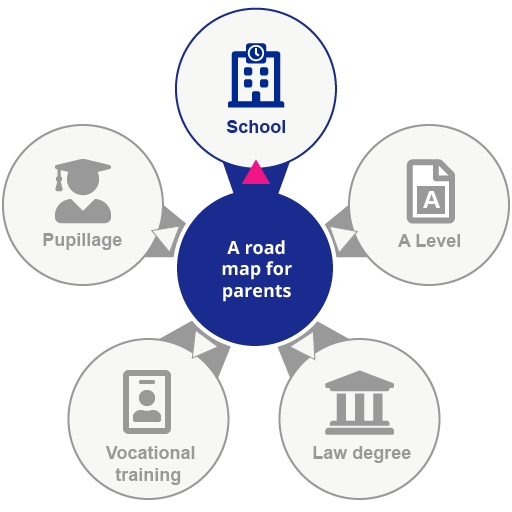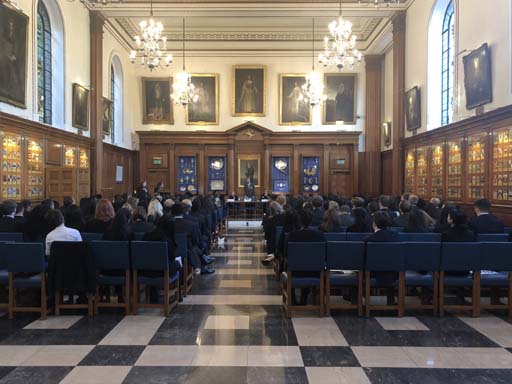School
Pupils should aim to acquire the skills that will equip them in a future career. Being a barrister requires many skills, including.
 Good oral communication skills
Good oral communication skills
Barristers need to be able to talk to clients, solicitors, judges and many others. They are also likely to be standing up in court and speaking, so enjoying public speaking is important.
 Good written communication skills
Good written communication skills
It is not just about oral communication. Barristers also need to be able to write clearly and accurately. This could involve putting complicated legal ideas into simple and straightforward language for clients and writing persuasive arguments in cases.
 Research skills
Research skills
From finding out what the law says on an issue, to investigating the best public transport to a court building, research is a big part of a barrister’s life. Much of it is done online, using legal databases and other useful sites. Being able to successfully conduct research enables barristers to find evidence to support the arguments they are making.
 Using evidence to support arguments
Using evidence to support arguments
Evidence is used rigorously to make historical claims, and discern how and why contrasting arguments and interpretations of the past have been constructed. An analytical approach to the strength and weaknesses of evidence, and in assessing arguments, are key skills for a career at the Bar.
 Skills in reading and absorbing information
Skills in reading and absorbing information
Barristers often have to read a lot of documents quickly. This could be for use in their arguments in court, to help give advice to a client, or to spot weaknesses in the other side’s case. This means it is important to be able to deal with large amounts of information, identifying the most relevant parts and understanding their value.
 Analytical skills
Analytical skills
Being able to analyse something means being able to break it into smaller parts and examine each part in detail. For example, with the statement ‘No vehicles on the grass’, you might ask what constitutes a vehicle (A car? A bicycle? A pushchair?). You might also ask whether the term ‘grass’ includes things like the neighbouring flower beds. As a barrister, when examining your client’s case, it is crucial to take this kind of detailed and questioning approach.
 Determination and motivation
Determination and motivation
Becoming a barrister is not always easy. When newly-qualified get there, they also find new challenges ahead, including having to make connections to help them get work and sometimes working long hours, often into the evening and at weekends. This means it is essential to have the determination to succeed and the motivation to keep going.
Reading, improving vocabulary, making inferences, using research, and the development of writing and oral communication skills are all key skills for a barrister. Similarly, the study of history at key stage 3 in England requires that pupils can ‘understand the methods of historical enquiry, including how evidence is used rigorously to make historical claims and discern how and why contrasting arguments and interpretations of the past have been constructed’. This analytical approach to ascertaining the strength and weaknesses of evidence, and in assessing arguments, are key skills for a career at the Bar.
Law as a school curriculum subject in the devolved nations
Law is not part of the National Curriculum of England, Wales, Scotland, or Northern Ireland; but pupils may study law at GCSE or A Level. However, it is not necessary for students to study law at these stages for a career in law.
Being a barrister also requires the ability to perform in front of other legal professionals and judges. Pupils could tailor subject choices, or extra-curricular activities, to develop this skill. For example, they might study GCSE drama, or join a drama group or a debating society. Barristers will also be running a business, so Business Studies may be an appropriate choice for them.
Your child might decide to undertake some work experience in a barristers’ chambers or law firm to decide if a legal career is right for them. You could encourage them to write to local businesses to see if this is possible and support them in doing so. Their school or college may be able to assist with this. Chambers and law firms receive a lot of requests for work experience and to maximise their chances of success, your child should write a full covering letter setting out what they hope to achieve through work experience, why they are interested in spending time at the chambers or law firm, and any subjects they have studied or activities they have undertaken which may demonstrate an interest in the law or the relevant skills set out above.
Attending civil and criminal court sessions
Members of the public can attend civil and criminal court sessions, so you may decide to accompany your child to a local court, although you may wish to note that the content of some cases can be traumatic.
It may be more appropriate to take them to county courts, or to magistrates’ courts where less serious crimes are dealt with, although you should be mindful that cases in these courts can still be traumatising.
A road map for parents and carers


